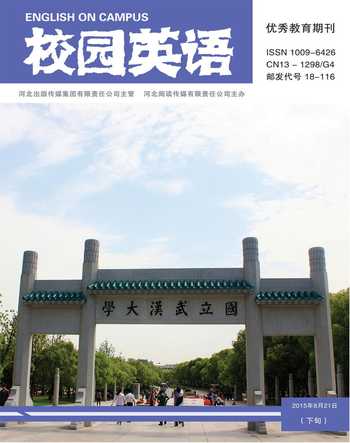Culture Hidden beneath Four Chinese Characters
马丹戎
Ⅰ.Introduction
In translation of English brands,foreigners names and other documents,interpreting both the literal meaning and deeper meaning of the Chinese characters is crucial.Because problems ofen arise in tranlation when we hope to achieve equibalence between the two different languages and cultures.Some Chinese characters carry deep-rooted cultural implications which could not be understood by westerners.An appropriate character accords with Chinese culture and peoples thoughts,it reaches cultural amalgamation and gains recognition.This project studied four successful samples in adoption of Chinese characters according to culture,they are “馬”,“众”,“龙”,and “黛”.
Ⅱ.“马” and “众” in Vehicle Brands Translation
Many foreign auto brand names are translated into “马” in China,which means “horse”,for instance,Hummer (悍马),BMW (宝马),Mazda (马自达)(Japanese brand).In ancient China,a horse was a kind of good transportation animal who works hard with swiftness and endurance and also attended wars with soldiers.A variety of accient poems and idioms commended horses.Horses appeal to Chinese people by the strong physique,handsome appearance,and loyalty.The gem from Lun Yu ——“Do not slack off on your duties and execute orders to the letter” expressed one of Confuciuss thoughts,which also represents “loyalty” in Chinese culture.On this basis,naming a car with “horse” to some extent implies the strong power and durability of the car.Meanwhile,the manufacturers intend to convince Chinese people by associating driving these brands with the ideas of being successful.
Another brand Volkswagen is translated into the popular name “大众”.According to Hofstedes Individualism Index Table,the value of Chinese culture is collectivism (许,106).Collectivistic cultures believe in obligations to the group,dependence of the individual on organizations and institutions a “we” consciousness,and an emphasis on belonging (许,100).“众” consists of three “人”,which means “people”,therefore,“众” implies “many people”,or “the group”.This auto brand name caters to Chinese value,accepted by Chinese consumers and wins a place in Chinese market.
Ⅲ.“龙” in Name Translation
The former permanent president of the European Council Herman Van Rompuy has a typical Chinese name——范龙佩.In ancient Chinese legend,dragon is a miraculous animal with long body,scale,two feet and horns on head.It can walk,fly,swim and command the wind and rain,standing for being sacred and has been transferred to the ancestor of Chinese nation(现代汉语词典).Chinese people tend to emphasize hierarchy and seniority.The feudal emperors liked to call themselves as “真龙天子 (true dragon)”,and Chinese like to call themselves as “龙的传人(descendants of the dragon)”.It is no wonder that many Chinese parents give their babies especially a boy “龙” as a name,hoping the kids possessing high rank and leading a noble life in the future.However,in English,according to Brewers Dictionary of Phrase and Fable,the image of a dragon is a fabulous winged crocodile.English idioms,like “blind dragon”,“fight like a dragon”,“a dragon lady”,etc.is in bad sense(Evans).
Ⅳ.“黛” in Name and Cosmetic Brand Translation
Audrey Hepburn is a well-known name in China,especially those Chinese characters which symbolize her —— 奥黛丽·赫本,who had the reputation of being a humble,kind and charming person.A cosmetic brand “Estee Lauder” is translated into “雅诗兰黛” and occupies middle-classed market in China.“黛” is a proper noun,referring to a kind of black and cyan pigment,with which the ancient Chinese women painted eyebrows(古代汉语词典).“脂油粉黛”(范,67)generalizes four common cosmetics:cream,oil,powder and pigment.Chinese culture is indirect,statements are carried out with more nuanced and roundabout tone of voice(许,179),people dont enunciate a ladys beauty in a forthright way.Therefore,“黛” became the synonym for the peerless and enchanting appearance of women.This character appears in a ladys name or a brand as an implication of good looking or the effect of using certain cosmetic product.
Ⅴ.Conclusion
Language and culture is embedded in cultural products,practices,perspectives,communities,and persons.One reflects the other,and they are best seen as joined.(许,132)Understanding Chinese culture goes first in translation,eseccially brand name and a persons name.The fundamental values of Chinese culture are collectivism,large power distance,and intra-group harmony.An appropriate adoption of Chinese character in translation is a kind of representation of Chinese culture,bringing about the sense of values and ideas.
References:
[1]Evans,Ivor,H.Brewers Dictionary of Phrase and Fable.14th edition.世界图书出版公司,1995.
[2]Newmark,Peter.Approaches to Translation.Shanghai Foreign Language Education Press,2001.
[3]范晔.后汉书-陈蕃传.商务印书馆.1990.
[4]古代汉语词典.商务印书馆,2005.
[5]刘士聪,谷启楠.中国古代经典名句英译.商务印書馆.2012.
[6]现代汉语词典.商务印书馆,1995.
[7]许力生.新编跨文化交际英语教程.上海外语教育出版社. 2008.

